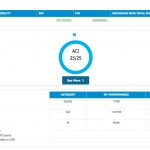
EtiAmmos / shutterstock.com
Time certainly flies, and 2018 marks the second year that rheumatologists who see Medicare patients are operating under the new Quality Payment Program (QPP) created by the Medicare Access & CHIP Reauthorization Act (MACRA). MACRA repealed the Fee-for-Service model under the Sustainable Growth Rate (SGR) formula and transitioned Medicare reimbursement to a system more overtly focused on quality and value of care.
The QPP has two pathways in which providers will be reimbursed for their Medicare Part B payments:
- Merit-Based Incentive Payment System (MIPS) and
- Alternative Payment Models (APMs).
Beyond the usual adjustments that are required in response to the Centers for Medicare & Medicaid Services (CMS) and other administrative regulators of our practices, the QPP requires a major shift in how we think about demonstrating value in our practices.
According to the CMS, 5,629 rheumatologists must participate in the QPP in the first performance year.1 The ACR is working to provide options for rheumatologists to use either pathway. The APM represents a more significant change from the traditional payment model, and the ACR has funded the development of a rheumatology APM that is currently in the testing phase. However, at this point, an overwhelming majority of rheumatologists will participate in the QPP via the MIPS pathway. With data requirements increasing for MIPS in 2018, rheumatologists must have a plan in place early for their reporting. Depending on what percentage of your practice is made up of Medicare Part B patients in 2018, the resulting 5% bonus/penalty can obviously be significant.
Rheumatologists can choose various reporting mechanisms to participate in MIPS, and it’s important to note that—among the options—MACRA created incentives for providers to report via registries—including significant bonuses for reporting via a Qualified Clinical Data Registry (QCDR). The ACR has operated its own QCDR, the Rheumatology Informatics System for Effectiveness (RISE), as a member benefit since 2014. RISE helped rheumatologists meet the quality reporting requirements of the now-discontinued Physician Quality Reporting System (PQRS) and can help you meet your current requirements under MIPS.
RISE established a great record of success for rheumatology in the 2017 performance year, and as a result of the increased reporting requirements and rapidly expanding participation in the registry, RISE will be even more valuable for rheumatologists in the 2018 performance year. Early adopters of RISE have demonstrated that they have a significant head start over their other rheumatology colleagues. If you would like to join the RISE registry and use it as your reporting option for 2018, register now.
MIPS Mechanics
MIPS scores the care we provide via four performance categories:
- Quality;
- Improvement activities;
- Advancing care information; and
- Cost
These are combined to generate a final MIPS Composite Score, which CMS uses to assess payment penalties/bonuses.

